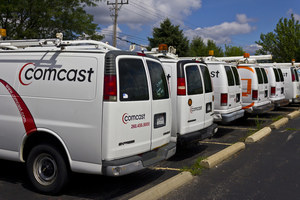 A group of non-exempt technicians who install cable, television, phone, security and internet services sued O.C. Communications Inc., Comcast Corporation and Comcast Cable Communications Management (the lawsuit claims they were joint employers) for failing to pay minimum or overtime wages, and they weren’t properly compensated for rest and meal breaks. Further, they were not reimbursed for expenses and were not issued accurate, itemized wage statements, which are all violations of the California labor code.
A group of non-exempt technicians who install cable, television, phone, security and internet services sued O.C. Communications Inc., Comcast Corporation and Comcast Cable Communications Management (the lawsuit claims they were joint employers) for failing to pay minimum or overtime wages, and they weren’t properly compensated for rest and meal breaks. Further, they were not reimbursed for expenses and were not issued accurate, itemized wage statements, which are all violations of the California labor code.The settlement was first rejected in April 2019 by U.S. District Judge Vince Chhabria because it “doesn't explain how the defendants' practices have changed or will change in the future.” Although Judge Chhabria said the "alleged wage and hour violations appear to have substantial merit" the issues seemed to be "systemic," and it appeared that the settlement was achieved at a discount, and that such a discount was "difficult for a court to swallow" without some assurance that the violations are likely not to happen in the future. The case is Soto, et al. v. O.C. Communications, Inc., et al., No. 17-cv-00251.
The technicians sometimes worked up to 60 hours per week performing installation services. According to court documents, they were paid on a “hybrid hourly and piece-rate basis, based on the various jobs and tasks" they performed for Comcast's customers. One of the lead plaintiffs, Desidero Soto, told the court that one day O.C. Communications (OCC) scheduled him for 32 jobs, but he was usually assigned eight. His supervisor told him to work through meal periods—he ate while driving from one job to another—and was required to be on call at all times. Another plaintiff, Jacky Charles, said he had to supply all tools required for the job, including several types of cable, wireless drill, drill bits, pliers, screwdriver, staple gun, boots and pants.
Charles also told the court that he OCC instructed him to underreport his hours for compensation. He had to report his start time one hour after actually working and if he reduced his total work time, OCC would manipulate his time cards accordingly.
Comcast Corporation was named as a defendant because, according to court documents, it controlled about 90 percent of OCC’s revenue stream. It “monitors and evaluates technicians’ work activities, work progress and whereabouts in real time during the course of the day through mobile devices.”
READ MORE CALIFORNIA LABOR LAW LEGAL NEWS
Another former cable tech said he was promised local routes. “We were lied to and given routes about an hour to 2 hours away. Never had the proper equipment to do our jobs. [OCC] don't believe in having a family life, having to work every weekend 12 hours a day. Getting a day off just to have family time was like pulling teeth. I wouldn't work for them ever again to be honest.”
O.C. Communications, Inc. operates as a fulfillment contractor specializing in cable and communications equipment installation. Its customers include enterprises, hotels, professional sports teams, the U.S. military, the State of California, universities, and prisons. On its website, OCC says that “a company is only as good as its employees, and at OCC, we train ours to be the best.”
